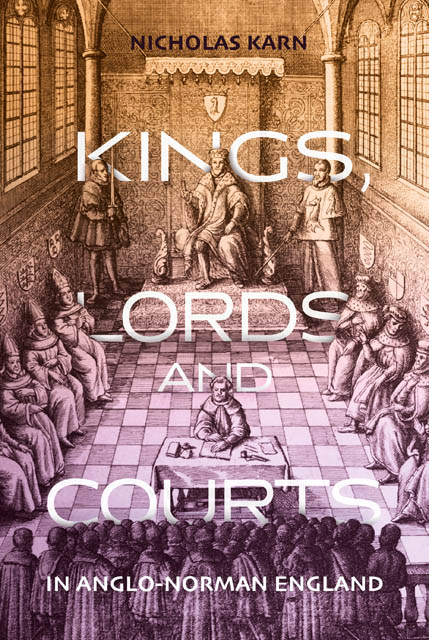Book contents
- Frontmatter
- Dedication
- Contents
- Preface and Acknowledgements
- List of Abbreviations
- Introduction
- 1 Lords and their Dependents in Court: The Later Anglo-Saxon Paradigm
- 2 The Aspirations of Lords in Eleventh- and Twelfth-Century England
- 3 Private Claims and Hundreds in the Later Eleventh and Earlier Twelfth Centuries
- 4 The Division of Hundreds and the Proliferation of Courts
- 5 From Debate within Courts to Debate between Courts: The Origins of Jurisdictional Debate
- 6 Courts, Pleas and Kings in the Early Twelfth Century
- 7 Pleas and Justices in the Early Twelfth Century
- Conclusion
- Appendix: The Evidence for Justices, 1100–54
- Bibliography
- Index
2 - The Aspirations of Lords in Eleventh- and Twelfth-Century England
Published online by Cambridge University Press: 18 January 2023
- Frontmatter
- Dedication
- Contents
- Preface and Acknowledgements
- List of Abbreviations
- Introduction
- 1 Lords and their Dependents in Court: The Later Anglo-Saxon Paradigm
- 2 The Aspirations of Lords in Eleventh- and Twelfth-Century England
- 3 Private Claims and Hundreds in the Later Eleventh and Earlier Twelfth Centuries
- 4 The Division of Hundreds and the Proliferation of Courts
- 5 From Debate within Courts to Debate between Courts: The Origins of Jurisdictional Debate
- 6 Courts, Pleas and Kings in the Early Twelfth Century
- 7 Pleas and Justices in the Early Twelfth Century
- Conclusion
- Appendix: The Evidence for Justices, 1100–54
- Bibliography
- Index
Summary
In one sense, lordship was straightforward; it was a reciprocal relationship between two individuals, where there was a substantial power differential, but where both sides could potentially benefit from the output, protection or cultural capital of the other. Yet lordship was also something rather more than this, in that it was also a matter of aspiration. For lords, lordship was a means for exercising dominance over others, and for creating a miniature society in which they might control those around them and under them. It was a model of interpersonal relationships as much as a legal and economic pattern.
A lot is knowable about how members of the elite conducted themselves in disputes and in court from the tenth to the twelfth centuries, especially in matters linked with land. The implications of cases between powerful and wealthy individuals could be very great, but they were by no means the norm. Those involved in cases over land, whether thegns or barons or knights, were free in law and so could act in accordance with individual or family interests; they were also guided by the expectations that attached to their class, which meant that they acted assertively and in accordance with notions of honour and so forth. Their strategies can therefore look quite modern at times, in that members of this class might act in ways that look individualistic. These kinds of cases and disputes dominate the surviving sources because of their implications and consequences, but they can only have formed a very small part of the total number of disputes that arose in England in the central middle ages.
In some settings, lordship was a powerful ideology that did much to form the conduct of those who were part of lordship relationships. In the poem on the Battle of Maldon, some of Byrhtnoth’s men willingly followed their lord to their deaths, and some tried to avenge him. For such as these, lordship formed a framework that made their lives and deaths meaningful. For these, it could be something that was emotionally satisfying and which made their lives and actions, and ultimately their deaths, intelligible.
- Type
- Chapter
- Information
- Kings, Lords and Courts in Anglo-Norman England , pp. 51 - 71Publisher: Boydell & BrewerPrint publication year: 2020



